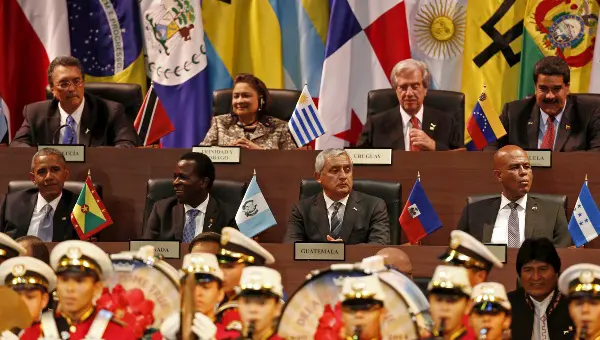Venezuelan President Nicolas Maduro and other experts viewed recent political changes in Venezuela and other countries in Latin America as part of the U.S. campaigns to reclaim hegemony in this region.
Earlier this week Maduro denounced a new "aggression", or political, diplomatic, economic and media attacks against Venezuela by the United States, ahead of a potential "military intervention."
He said the private media and political parties that form the opposition right-wing Democratic Unity Roundtable (MUD) are inflaming tensions in the country.
Maduro accused the United States of espionage and aircraft incursions for spying activities. The incursion of U.S. planes into Venezuela's airspace was detected on May 11 and May 13, said the president.
Maduro has viewed these actions as part of a series of steps taken by the United States to weaken left-wing governments in Latin America, which include the temporary suspension of President Dilma Rousseff in Brazil and the election victory of President Mauricio Macri in Argentina.
Experts said that this new "aggression" against Venezuela is simply a continuation of the foreign policy carried out by Washington since 2008 to regain its hegemony in the region. They saw this as part of "smart power" being projected with success in the continent.
Carolus Wimmer, former president of the Latin American Parliament, told Xinhua that he sees various aims behind Washington's actions, mainly to regain an economic and military edge.
Wimmer said he believes the United States is deliberately trying to create failed states, "which it can easily control and exploit economically."
Political analyst Luis Delgado Jaramillo told Xinhua that the United States has been changing tactics, as exemplified by its rapprochement with Cuba.
"When it seems the U.S. is reaching out to Cuba while seeking to destabilize other countries, this is simply a change of tactic in Cuba that seeks to minimize the impact of its revolution," said Delgado.
This is proven by the fact the U.S. government has still not lifted the economic blockade on the island.
The experts said that another tactic employed by Washington has been the erosion of regional blocs such as the Union of South American Nations (UNASUR), the Southern Common Market (Mercosur) and the Community of Latin American and Caribbean States (CELAC).
According to constitutional lawyer Ana Cristina Bracho, these actions are aimed at reigning the international financial system, which seeks to stop the rise of alternative financial models in emerging countries.
To date, Brazil is the only Latin American country to be part of the emerging economies of the BRICS (Brazil, Russia, India, China and South Africa) or join the Asian Infrastructure Investment Bank (AIIB).
"The financial order is fighting on various fronts. It has allied with the press to prevent the existence of alternative financial centers, not controlled by the U.S.," Bracho told Xinhua.
Political analyst Jose Luis Gonzalez Villegas said this latest incursion into Venezuela and Brazil was "new for the U.S."
He told Xinhua that events in Brazil, Argentina and Venezuela showed that the United States was seizing the opportunity to take its hegemony back.
The experts interviewed believed left-wing governments had committed "their own mistakes" amid U.S. advances in the region.
They also said the levels of "political awareness" across Latin America would also be crucial to determining the region's future.
(APD)
 简体中文
简体中文







